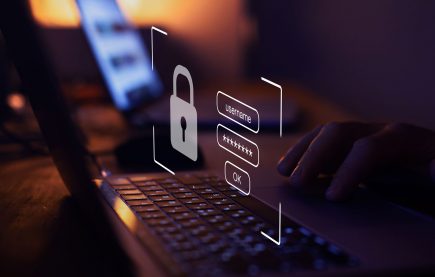
Why More B2Bs Should Pay Attention to Their Cybersecurity Efforts
Every year sees many high-profile corporate data breaches. In 2020 alone, Twitter, Marriott and Ancestry.com each made headlines when it became clear that hackers had gained access to their private networks and made off with valuable company data.
However, despite criminals targeting these massive companies with large pools of consumer data, B2B companies aren’t immune to cybercrime. There’s research showing that as hackers ramp up their efforts, almost every company—regardless of size or niche—could be at risk.
The cost of a successful attack could even be enough to put some companies out of business.
This is why B2B companies should pay close attention to how they’re handling cybersecurity—and a look at how any company can take steps to protect themselves from hackers and cybercriminals.
Every Employee Can Help Defeat Common Cyberattacks
Cybercriminals will take advantage of any weakness they can to break into a company network and steal valuable data. In some cases, this includes employees who don’t have much cybersecurity knowledge but still have access to the company files and programs they need to do their job.
Phishing attacks use emails or other digital communications that appear to be from a legitimate source when, in reality, they were sent by a hacker. For example, an employee may receive an email from “Amazon Customer Service” asking them to reset their password or download a file. If they follow the email’s instructions, they could hand over their login information or unwittingly install malware onto the company network.
Depending on the kind of information and access a hacker has, these attacks may be more company-specific. They may use or spoof internal email addresses to tease out information they need to break into the company’s digital storage.
Fortunately, phishing emails are often easy to spot if you know what to look for. With a little bit of training, every employee, regardless of cybersecurity knowledge, can be trained to spot a phish.
There are several tools for training employees on cybersecurity basics—like how to identify a phishing attack. However, you don’t really need any advanced tech. So long as your employees understand the essentials, they can be a major help when it comes to preventing a breach.
Your Cybersecurity Professionals Can Be In-House or Outsourced

Investing in cybersecurity is ultimately going to be a major business decision. You’ll have to ask yourself and your team what kind of risks are you willing to tolerate, and how much you can spend to keep your data and company network safe.
Fortunately, the cybersecurity industry is growing rapidly—which means you have options for how you’ll defend your business.
Many large businesses have IT departments with cybersecurity experts who work to respond as quickly as possible to potential data breaches or new digital threats. Other businesses, especially those with less money to spare for IT services, opt instead to work with service providers offering third-party IT services. Depending on your budget and needs, both of these can work.
For example, you may run a data center in-house due to the large volume of information you collect, store and manage for your clients. This data center is a major target for hackers, especially if that data is confidential, sensitive or otherwise valuable.
There are a number of security best practices that you can implement to keep a data center safe. However, some kind of cybersecurity investment will be necessary. You’ll probably have to decide whether an in-house cybersecurity team is worth the cost—or if it’s a better idea to work with a third-party service provider who can monitor your data center’s network security.
No matter what budget you have put aside for IT and cybersecurity, it’s possible to find a service at a price point that works for your company.
The Right Tech Can Help You Beat Ransomware
Ransomware is a kind of virus or malware that uses data encryption to hold files and computer systems hostage. Once a system or network is infected, the hacker will request funds—usually in the form of cryptocurrency—promising to release the files upon receipt of payment.
Many companies, because they don’t have backups and can’t risk losing their information, will pay up to recover their files. Paying the ransom, however, doesn’t guarantee you’ll get your information back—and some security agencies even recommend against it.
Ransomware is likely one of the biggest cybersecurity threats to companies right now, with ransomware attacks becoming more frequent every year.
Besides basic security practices—like training employees in recognizing a phish—there are a few ways you can minimize the damage a ransomware attack could cause. For example, creating and maintaining easy-to-access backup copies will keep your data available, even if it’s locked down by ransomware.
Vigilance Can Be a Company Value
Awareness is one of the best tools companies have when it comes to cybersecurity. If you’re staying on top of the latest developments—and investing in cybersecurity tech and staff— you have a much better chance of avoiding a data breach.
In general, when hackers are able to break into a company’s network, it’s because they’ve made some kind of basic mistake in their cybersecurity practice. In 2016, for example, 96% of companies that fell victim to a breach didn’t encrypt their data. That meant the hackers, after breaking into the network, had full access to any information they recovered.
Many of these companies also don’t take advantage of useful security practices—like network segmentation and access management, which both limit employee access to company information and apps based on what they need to do their job. As a result, if a hacker manages to break into an employee account, they may not have access to 100% of the network.
Good security practices—even the most basic ones—can go a long way in keeping your data safe.
How B2B Companies Can Defend Their Data Against Hackers
B2B businesses—regardless of size or the products they sell—can easily fall victim to a data breach. Fortunately, with the right planning and tools, it’s possible for any business to protect themselves against hackers and cybercriminals.
Simple employee training can go a long way. For businesses wanting more defense, advanced security tools and a dedicated cybersecurity staff can help provide some extra protection against attacks.
Making cybersecurity core to business decision-making will also be a major help. With the right workflows, you can always be thinking about how data may be vulnerable, as well as the steps you can take to protect your and your client’s information.



